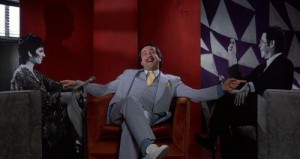Few movies have ever bugged me as much as Dances With Wolves. I actually took the plunge and spent what felt like 6 hours in a movie theater watching that thing when it came out. I was never a Kevin Costner “hater.” I was never his biggest fan either, but I gave the man his due for No Way Out and Bull Durham. Beside miserably squirming through most of Field of Dreams, I had no ax to grind with the guy at that time in his career. For whatever reservations (no pun intended) I might have had, the story seemed like it might appeal to the broad side of me that loves Little Big Man. My wife and I decided to give it a shot on the big screen.
Man, did that movie blow! And its universal acclaim over the coming months with critics and Motion Picture Academy voters really drove us nuts. It was hard to ever like Costner again, and I disliked that movie so much that it helped me feel the pain “people of color” in America and probably worldwide have felt as Hollywood movie after Hollywood movie presents the plight of their people through the eyes of a Saintly, Heroic White Person. (And what was with Mary McDonnell doing in that movie with workout tape–era Jane Fonda‘s hairdo?)
Most recently The Blind Side was the Hollywood film to bolster this notion. Note, in the linked review, that despite the fact that the story contained probably a good deal of truth that most likely Costner’s crime again me and Native Americans has sensitized critics to new levels. You say you didn’t see The Blind Side or Dangerous Minds or Freedom Writers? I didn’t either, but although I liked Mississippi Burning, I felt a little uncomfortable by the strong presence of Saintly, Heroic White People. There are a lot of other movies that play out this way, and despite the fact that I like my share of them, I am always a little embarrassed for what I imagine moviegoesrs of minority groups may be feeling. I console myself with the fact that I’m a big fan of Ice Cube‘s Barbershop movies and that amazing, little indie movie made by and about a group of Native American friends in contemporary society, Smoke Signals.
Unlike the Hollywood movie industry, however, African Americans have played a strong leading role in music since nearly the beginning of the recording age. Any American of any race born in the 19th century forward has little excuse not to know and love at least some music by African American artists. So why have I come across so many intelligent, educated, music-loving white people who rave about Dusty Springfield‘s 1969 album, Dusty in Memphis, as if it’s a watermark in soul music?
Check out this typical rock press take on the album. Despite the fact that the writer makes it clear that Dusty wasn’t all that happy with the record or being in Memphis, singing in the same vocal booth in which true Memphis greats sweat and slobbered and playing with arguably one of the music industry’s greatest backing bands, he and a legion of modern-day fans of the album clutch onto the myth.
Far from rescuing Springfield’s career, Dusty in Memphis froze it in time, and she would not have another Top 40 hit for more than two decades. But for this album’s army of fans, who’ve picked it up in second-hand stores or in a variety of re-released formats, Dusty in Memphis is not only a popcultural milestone but a timeless emotional reference point.
I have no desire to argue the merits of the album itself. I think it’s merely OK. If I’d bought it in a used bin for 50 cents when I was an idealistic kid I would have held onto it and gotten some mild enjoyment out of it, but beside “Son of a Preacher Man,” which for my money is on par with a similar, fun, semi-corny country-soul tale like Bobbi Gentry‘s “Ode to Billie Joe” or R.B. Greaves‘ “Take a Letter Maria,” I guess I lack the pop sensibility and emotional capacity to identify either the milestone or the reference point this writer notes.
The album’s OK. Dusty Springfield was OK. Her first hit, “I Only Want to Be With You,” is outstanding! Sadly, as I learned as a completely misguided, horny teenage boy, the assumed “super-cute” musical equivalent of a young Julie Christie behind “I Only Want to Be With You,” as I bet many American boys and young men wished all cute-sounding Daughters of the British Invasion would look at that time, was nothing special. She was not even as mildly cute Petula Clark, for instance. Nice bouffant, I guess, but that’s not what I was hoping to find. Bummer. Oh, if only the English had done like the French and matched their Swingin’ Sixties cutiepies up in a recording studio with dirty, old pervs. I’d buy some half-assed Julie Christie single. But that was and is neither here nor there. Continue reading »




